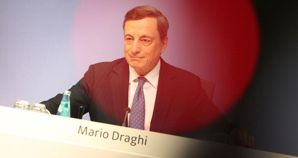Between the Ecb and Berlin is an open clash on monetary policy. “It is essential that concerns about financial stability or to the sustainability of public finances does not lead to postpone the exit from monetary policy ultra-accommodative” of the Ecb. To say it was the president of the Bundesbank, and adviser to the Ecb, Jens Weidmann, according to which the reversal of the trend, after years of monetary expansion unprecedented, “must decide” solely on the basis of the developments of inflation.”

Double German attack, the Qe of Dragons: the “destabilizing”
A new broadside that comes after the controversy raised in Germany on line expansive choice by the Ecb, been working to counter the risks a deflationary burden on the euro area. In the economic bulletin of the Ecb, there are signs of possible reductions in the partial stimuli, invoked particularly by observers with the germans. A front which is added in addition Weidmann also the powerful Finance minister, Wolfgang Schaeuble, according to which the Ecb “has reached the limit of its possibilities”.
Yesterday was the time of the Council of “five wise men” of the Government and Deutsche Bank. The council of economic experts that advises the Government in Berlin has stated that the degree of monetary stimulus in the euro area “is no longer appropriate” given the recovery of the economy of the region. The chief economist of Deutsche Bank, David Folkerts-Landau, one of the critics most virulent of the Ecb, has spoken even of the “dark sides” of the Qe, the program of purchase of securities by the institute of Frankfurt.
Other observers, the germans noted that the budget of the Eurotower was up the other 12.5 billion to a record of 3507,4 billion euros on the occasion of the fifth anniversary of the presidency of Mario Draghi. In the Bulletin it is stated, however, that the governing Council of the Ecb reiterated its intention to carry on until the end of the current plan of purchases of the securities by 80 billion euros per month until the due date to march 2017 “or even longer, if necessary, and in every case until it finds a sustainable adjustment of inflation consistent with the inflation target”.
“In the perspective – adds the Ecb – the Board maintains the commitment to preserve the very high degree of settlement money that is necessary to ensure a sustainable convergence of the profile of inflation to rates below, but close to, 2% over the medium term”.

hamper growth in the Eurozone, we all waiting for the moves of the Dragons
In the bulletin, it is then passed on to speak of private investment. In the euro area “business investment fell in 2008 and then again from 2011,” says the Ecb. “The recovery started in 2013, but with an average rate lower than observed before the crisis. In the United Kingdom and the United States, investments had reached a low point in 2009″. “Furthermore, there is heterogeneity between the countries of the euro area. The increase of nearly 15 percent recorded by business investment after the minimum point has been determined to a considerable extent by Germany, Spain and France, against – law – a limited contribution to Italy”.
spread. overall, “the yield spreads of sovereign bonds compared to the rate of the German Bund ten-year remained essentially stable in most Countries, with the exception of Greece and Italy, where they are respectively 12 and 21 basis points”, notes the Ecb’s economic Bulletin, adding that the yields on government securities long-term euro area “increased from the beginning of September. During the review period, which runs from 8 September to 19 October, the yields on ten-year government bonds showed increases of between 6 and 30 basis points, with a peak precisely in Greece and Italy”. The spread, therefore, return to the increase of the fever among the 19 economies of the euro area, despite the purchase of 80 billion euros per month of securities including sovereigns from the european central Bank

Dragons: “The Qe will not move wealth to Countries with weak Eu”
Brexit. The euro-zone has proven resilient and has suffered a limited impact from the referendum in the United Kingdom. The Ecb stresses, however, that “it is not possible to exclude negative consequences on the euro area in the medium term”.
Now, it is stated, “in the Uk, economic growth remains robust. However, the uncertainty surrounding the negotiations for the exit from the european Union should curb domestic demand, especially on investments”. For the Ecb, “the aggregate impact depends on the future evolution of the interchange between the euro area and the United Kingdom”. At the same time “economic activity in the euro area could perhaps benefit from, for example, of the potential transfer of the financial services or increased flows of foreign direct investment redirected from the Uk to the euro area”.
© Reproduction reserved
No comments:
Post a Comment